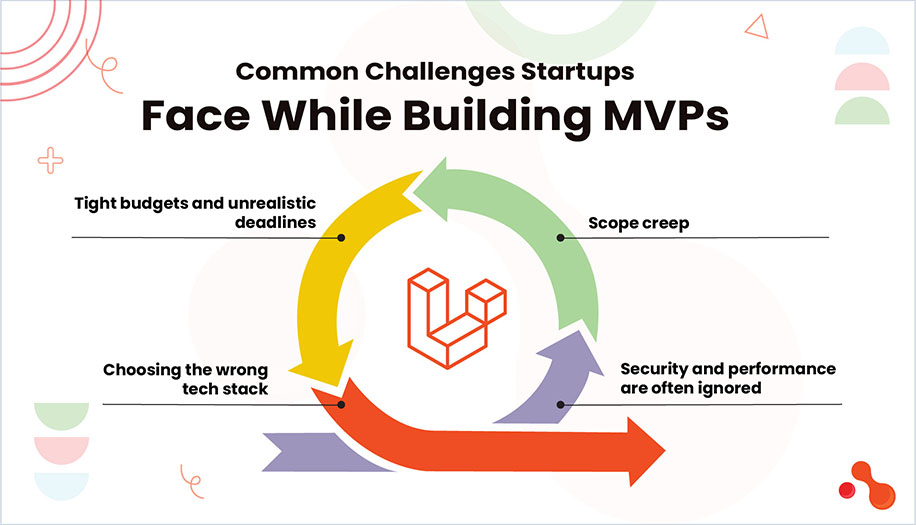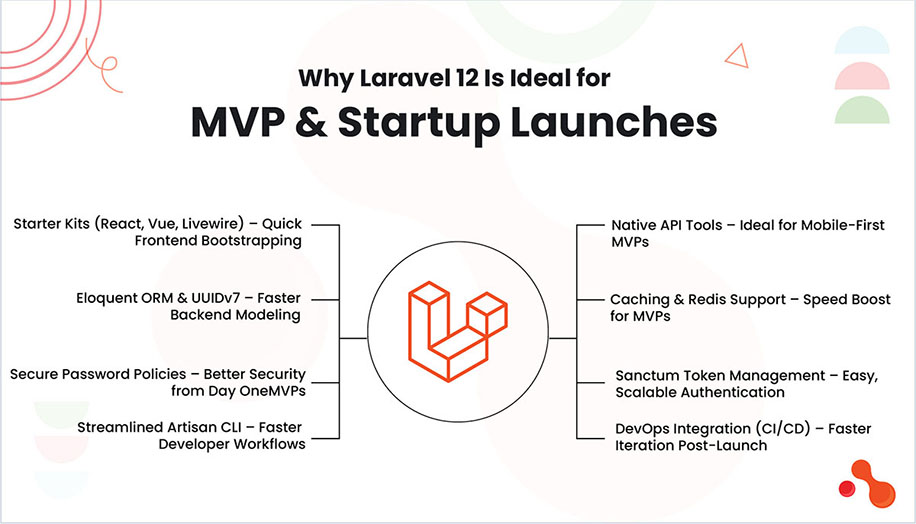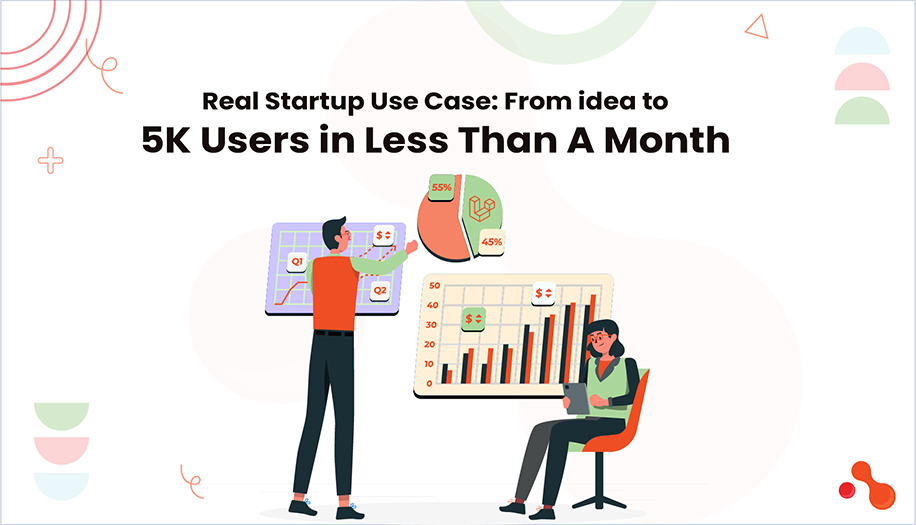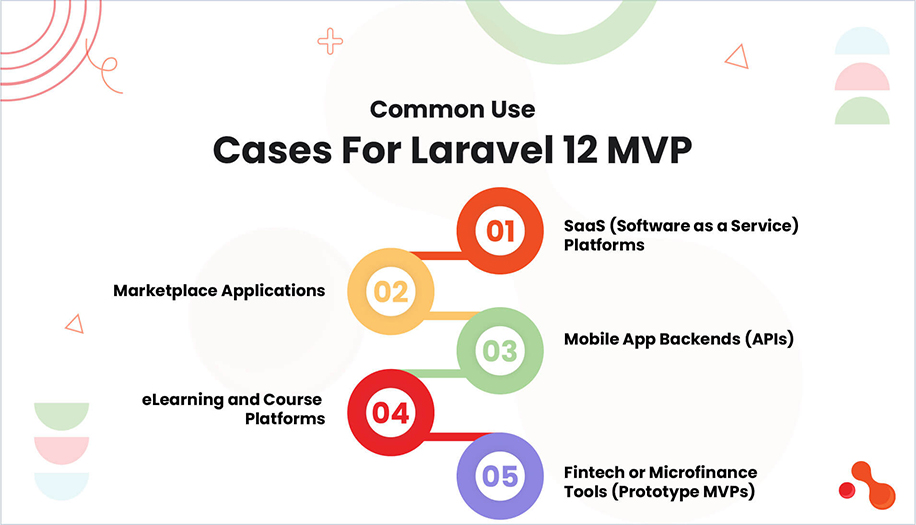Laravel 12 for MVPs and Startup Product Launches
CTOs and founders are choosing Laravel 12 for its speed, scalability, and developer ecosystem. Discover how it solves real product challenges in 2025.
Introduction
When I started my journey as a developer, the biggest challenge I saw wasn’t just writing code it was launching products fast, without compromising security or scalability. Years later, as the founder of Acquaint Softtech, I’ve seen hundreds of startups struggle with the same thing: choosing the right tech stack for their MVP while working under pressure, tight budgets, and big dreams.
You may ask: Why use Laravel 12 for startup MVPs?
It’s not just a framework it’s a strategic toolkit built for speed, performance, and future scale. Our 70+ in-house developers—backed by official partnerships with Laravel, Statamic, and Bagisto have helped startups bring their MVPs to life faster and more cost-effectively than ever imagined.
That's precisely why we lean into Laravel 12 for most startup launches.
In this blog, I’ll walk you through the Laravel 12 benefits for strong MVP development for startups that solve real challenges and long-term success.
Common Challenges Startups Face While Building MVPs

No matter how great the idea is, getting an MVP off the ground comes with its own set of realities—ones I’ve seen repeat across nearly every early-stage startup I’ve worked with. You’re not just trying to build fast—you’re trying to build smart, with limited time, money, and resources. And in that chaos, certain issues show up more often than you’d expect.
From rushed tech decisions to team inefficiencies, here are the most common challenges of MVP development that can slow down—or completely derail—a product launch:
Tight budgets and unrealistic deadlines often lead to rushed development, leaving long-term product health at risk.
Scope creep quickly derails progress when too many features are packed into what should be a lean MVP.
Choosing the wrong tech stack creates rework later, especially when the product starts to scale.
Security and performance are often ignored in the early stages, making MVPs vulnerable once they're live.
Scalability issues arise when architecture isn't designed with growth in mind from the start.
Poor backend workflows can bottleneck collaboration and slow down feedback loops between dev and product teams.
Lack of clear communication between stakeholders leads to frequent misalignment and rework.
Inadequate testing cycles delay go-to-market timelines and cause early user friction.
Unexpected expenses resulting from change of requirements, market conditions and lack of contingency strategy leads to budget overruns.
These aren’t just theoretical risks—I’ve seen startups delay launches or rebuild entirely because these problems weren’t addressed early on. That’s why finding the right MVP solution is often the first real advantage in overcoming them.
The goal is simple: build your MVP fast with Laravel, but build it right.
Not Sure What’s Slowing Your MVP Down?
If you're stuck in planning or juggling too many priorities, you're not alone. Many of the challenges you just read—tight timelines, scope creep, and backend delays—are more common than you think. We’ve helped startups overcome these pitfalls by focusing on what matters most from day one.
Why Laravel 12 Is Ideal for MVP & Startup Launches

One thing I’ve consistently noticed while working with startups is how quickly priorities shift from validating an idea to supporting real users, often within a matter of weeks. In those early stages, every technical decision matters, especially the one about your backend framework. Laravel 12 isn’t just developer-friendly—it’s built to meet the real-world needs of MVP builders. In fact, of the top 1 million websites, 2.45% use Laravel.
Here’s a breakdown of Laravel 12 features and how each one directly solves startup challenges:
Laravel 12 Feature | MVP Benefit |
Starter Kit (React, Vue, Livewire) | Quick frontend bootstrapping |
Eloquent ORN & UUIDv7 | Faster backend modeling |
Secure password policies | Better security from day one |
Streamlined Artisan CLI | Fast developer workflows |
Native API Tools (streamJson, rate limiting) | Ideal for mobile-first MVPs |
Caching & Redis support | Speed boost |
Sanctum token management | Easy scalable auth |
DevOps Integration (CI/CD) | Faster iteration post-launch |
1. Starter Kits (React, Vue, Livewire) – Quick Frontend Bootstrapping
Laravel 12 includes starter kits with built-in support for React 18+, Vue 3, and Livewire 3, helping developers skip the tedious setup phase. This is incredibly useful when your team needs a quick minimum viable product launch with a polished frontend.
2. Eloquent ORM & UUIDv7 – Faster Backend Modeling
Eloquent remains one of Laravel’s most powerful features, and version 12 brings UUIDv7 support to the table—making it easier to build backend systems that scale with confidence and consistency.
3. Secure Password Policies – Better Security from Day One
Security often takes a backseat during MVP development—but Laravel 12 enforces strong password rules right out of the box. This means you're not patching security holes post-launch. You're covered from the start.
4. Streamlined Artisan CLI – Faster Developer Workflows
The Artisan CLI in Laravel 12 helps automate everything from generating controllers to seeding databases. It's a huge time-saver, especially for lean teams working on tight deadlines.
5. Native API Tools – Ideal for Mobile-First MVPs
With tools like Response::streamJson() and built-in rate limiting, Laravel 12 supports lightweight, high-performance APIs—ideal for mobile apps or SPAs where efficiency matters.
6. Caching & Redis Support – Speed Boost for MVPs
Nothing kills early user traction like slow load times. Laravel 12 integrates Redis caching and queue management tools like Horizon, helping your MVP stay responsive even under growing traffic.
7. Sanctum Token Management – Easy, Scalable Authentication
Laravel 12 includes refined Sanctum features for token-based API authentication. Whether it's user sessions, mobile access, or admin roles, everything's manageable and secure from day one.
8. DevOps Integration (CI/CD) – Faster Iteration Post-Launch
From zero-downtime deployments to GitHub Actions integration, Laravel 12 is built with DevOps in mind. This helps you ship updates faster and maintain a stable product with fewer manual processes.
Laravel 12 doesn’t just support your MVP—it anticipates the demands that come after. These features give you a strong foundation to build fast, scale smart, and iterate confidently.
Still Evaluating Tech Stacks for Your MVP?
Choosing the right framework can feel like a gamble—but it doesn’t have to be. Laravel 12 isn’t just feature-rich; it’s built for startups that need to move fast without sacrificing future scalability. If you’re comparing options, we can help you make a confident, informed decision.
Real Startup Use Case: From Idea to 5K Users in Less Than A Month

Not long ago, we worked with a startup founder who had a clear goal: launch their MVP in just over one month to secure investor traction. The idea was solid, but like many early-stage teams, they were stuck on one major decision. What tech stack to choose. Time was tight, and the team was small. Every decision carried weight.
They came to us unsure whether to go with Node.js, Django, or Laravel. After walking them through the pros and cons, they chose Laravel 12—and that decision made all the difference.
Within the first week, we had the frontend bootstrapped using Laravel’s Livewire starter kit, and backend modeling was up and running with Eloquent ORM and UUIDv7 support. Authentication, APIs, caching, and basic deployment pipelines were all in place by the end of Week 3.
The result?
MVP launched securely and on time
Scaled to over 5,000 users within 15 days
The team easily added new features post-launch with no major rework
This is one of many cases where choosing the right foundation led to both short-term speed and long-term scalability. If you're looking to move fast and avoid technical debt, partnering with a Laravel development company can make all the difference.
Sometimes, all you need is the right Laravel team for your product launch—and the clarity to build your MVP in 30 days with Laravel, the smart way.
Want Results Like This for Your MVP?
The startup we helped didn’t just launch on time; they scaled fast and iterated with ease. If your goal is to ship a working MVP and avoid unnecessary rework, it starts with having the right development partner and a clear roadmap.
Common Use Cases For Laravel 12 MVP

Digital transformation has not spared any industry hence many types of businesses can benefit from developing an MVP. In fact, considering the stiff competition, it is vital all businesses develop their online web app.
Laravel is one of the fast MVP development frameworks and there is a good reason for that. It is robust, feature-rich, and highly secure making it ideal to develop a wide range of MVP applications. It is like an MVP Swiss Army Knife. Choosing Laravel 12 to develop your MVP can give your business a significant head start.
Some of the use cases for Laravel 12 MVP are listed here:
SaaS (Software as a Service) Platforms
Example MVPs:
CRM tools
Project management dashboards
Subscription-based analytics tools
Why Laravel Works: Laravel offers ready-to-use features like user authentication, billing (with Laravel Cashier), role-based access control, and REST APIs. This allows you to get a functioning SaaS product up and running in days. Integration with tools like Laravel Nova or Filament can accelerate admin panel creation without custom UI coding.
Marketplace Applications
Example MVPs:
Multi-vendor eCommerce platforms.
Service booking apps (freelancer marketplaces, home services, etc.)
Why Laravel Works: Laravel's Eloquent ORM and relational model handling simplify building complex relationships—users, vendors, orders, products, and reviews. Policies and Gates streamline access control. You can scale horizontally with Laravel Octane or break features into modules as you grow.
Mobile App Backends (APIs)
Example MVPs:
On-demand delivery platforms
Fitness apps with tracking and social features
Event ticketing platforms
Why Laravel Works: Laravel Sanctum and Passport enable secure API token management. You can expose RESTful or GraphQL endpoints and build a robust backend for React Native, Flutter, or Swift-based mobile apps. The testing and debugging tools make it easy to iterate quickly based on app store feedback.
eLearning and Course Platforms
Example MVPs:
Microlearning apps
Language learning tools
Online tutoring platforms
Why Laravel Works: Laravel enables user registration, content management (videos, quizzes, notes), and payment processing. Features like file uploads, quiz scoring, certificates, and admin dashboards can be added modularly. Laravel Scout and Algolia can even provide fast content search.
Fintech or Microfinance Tools (Prototype MVPs)
Example MVPs:
Budgeting apps
Microloan platforms
Financial literacy games
Why Laravel Works: Laravel's security features (CSRF, validation, encrypted sessions) are crucial. You can start with a safe MVP, and then add payment gateway integrations, user analytics, and reporting tools over time.
B2B Tools with Team Collaboration Features
Example MVPs:
Document collaboration apps
Kanban-style team task boards
Team chat or feedback tools
Why Laravel Works: Laravel's real-time ecosystem (Laravel Echo, Pusher, Reverb) supports collaborative updates and messaging. Middleware can manage team-based access control, while policies ensure secure data sharing.
AI-Integrated MVPs
Example MVPs:
AI content generation tools
ML-based recommendation engines
AI-driven chatbot apps
Why Laravel Works: While Laravel isn’t an ML engine itself, it integrates easily with Python-based services via APIs. You can build the business logic and frontend in Laravel, and communicate with AI backends (e.g., hosted on AWS Lambda or FastAPI) seamlessly.
Laravel 12 MVP Launch Timeline + Checklist
.jpg)
When a startup approaches me asking, “How fast can we launch?”—my answer is always: that depends on how focused we stay from day one. Over the years, we’ve fine-tuned an efficient 6-week roadmap to help teams go from idea to MVP launch without cutting corners on quality, security, or scalability.
Whether you’re just validating your concept or prepping for user feedback, this timeline gives a practical structure to follow when working with Laravel 12.
6-Week Laravel MVP Roadmap
Week | Milestone | Key Focus Areas |
Week1 | Discovery & Planning | Idea validation, competitor research, Laravel stack confirmation, wireframing |
Week2 | Backend Setup | Set up Laravel project, database structure, authentication, starter kit integration |
Week3 | Core Features & APIs | CRUD modules, Laravel Sanctum, API endpoints, UI layout |
Week4 | Testing & Deployment Prep | Unit & feature testing, CI/CD setup, bug fixes |
Week5 | MVP Launch | Production deployment, performance optimization, live monitoring |
Week6 | Feedback & Iteration | Collect user data, improve UX, prioritize next feature sprint |
Laravel MVP Development Checklist
Here’s a streamlined checklist we typically follow when launching MVPs with Laravel 12:
Planning & Validation
Define the core problem you're solving
Research target audience & competitors
Choose Laravel 12 + appropriate starter kit (Livewire, Vue, React)
Finalize core MVP features (no extras)
Setup & Configuration
Create a Laravel 12 project report
Setup environment: .env, database, mail configs
Install and configure starter kits
Configure authentication using Laravel Sanctum
Backend & API Development
Design DB schema and relationships (Eloquent + UUIDv7)
Build modules for core features
Create RESTful APIs with proper rate-limiting
Implement caching with Redis
Setup authorization and role management (if needed)
Frontend Integration
Connect API to frontend (Livewire/Vue/React)
Build minimal UI components for key workflows
Implement responsive design for mobile-first usage
Testing & QA
Write unit tests and feature tests (Laravel’s built-in test suite)
Test authentication, API endpoints, and critical flows
Run performance tests and fix bottlenecks
Prepare CI/CD pipeline (GitHub Actions or Envoyer)
Go-Live & Post-Launch
Push code to the production environment
Enable monitoring tools (e.g., Laravel Telescope, Sentry)
Setup email notifications and alerts
Gather user feedback and analyze usage
Plan a second sprint based on the data
Getting It Right
The secret to building a successful product by first launching an MVP is to start small but plan big. Define the project scope and leverage Laravel's core features that allow you to transform it into full-fledged software without any worry about technical debt.
Here are a few other tips to build the ideal Laravel 12 MVP for your business:
Use Laravel Breeze or Jetstream for instant scaffolding and login flows.
Build RESTful APIs if you plan to support mobile apps or SPA frontends.
Write tests from day one to avoid regressions as your product evolves.
Leverage Laravel’s service providers for clean architecture and modular growth.
Keep environment configurations clean and secure—especially in production.
Let’s Build Your MVP—Faster, Smarter, and Ready to Scale
At Acquaint Softtech, we’ve helped startups just like yours launch in weeks—not months. With Laravel 12, our team delivers secure, scalable MVPs that are built to grow. If you’re serious about getting to market without delays or tech debt, let’s talk.
Laravel vs. Other Frameworks For MVPs
Choosing the right tech stack is more important than you can imagine. It is responsible for making your MVP faster, more scalable and easy to develop and maintain. These are key elements that will ensure you gain an edge over your competitors.
There are many technologies and frameworks available which can be confusing for businesses with little or no knowledge of how to go about selecting one. Some of the main factors to consider include time-to-market, scalability, budget, and security. Laravel stands out by offering full-stack capabilities, rapid dev tools, and elegant syntax. all in one PHP framework.
At its core is the MVC architecture which forces good coding practices thus preventing technical debt. It has been specially designed for rapid Laravel development and prototyping. Its built-in security saves hours of coding time and does the job of preventing major cyber attacks. It is highly scalable and has a large ecosystem.
In fact, Laravel isn’t just a framework. it’s an ecosystem. Here’s what startups can leverage beyond Laravel core:
Forge: Need quick and scalable server deployment? Laravel Forge lets you spin up production environments in minutes.
Envoyer: For zero-downtime deployments—perfect for apps already gaining early traction and needing regular updates.
Vapor: Serverless Laravel deployment on AWS? Yes, please. Laravel Vapor helps you launch high-performing MVPs with serverless infrastructure.
Laravel Sail: With a built-in Docker environment, Sail makes local development and team collaboration easier—especially if you're onboarding junior or remote developers.
Here is a comparison of Laravel 12 with several other frameworks do help you put your mind at ease:
Feature | Laravel 12 | Django | Node.js |
Speed of Development | High | Medium | Medium |
Built-in Auth, Routing, ORM | Yes | Yes | Stack Dependent |
Community Support | Very High | High | Medium |
Ecosysystem (DevOps, Testing, etc.) | Rich | Moderate | Decentralized |
Learning Curve | Moderate | Moderate | Stack Dependent |
With version 12, Laravel takes clean syntax, elegant architecture, and extensive ecosystem to a new level. Startups can leverage Laravel to accelerate development while maintaining high standards of security, performance, and code quality.
The fact that Lararvel has a massive community following will work to your advantage when you choose to develop your MVP with Laravel 12. It is the more cost-effective option for high quality MVP development as well, since the cost to hire Laravel developers is a lot lower.
Get A Head Start On Your MVP With Laravel 12
Laravel has introduced several new features in version 12 which becoming apparent in the comparison of Laravel 12 vs Laravel 11. Laravel 12 has the features that matter while developing an MVP. Hire Laravel developer for MVP - this could the best strategy to boost your business.
In fact, some of the new features in Laravel 12 focus on MVP development:
Anonymous Migrations by Default: This eliminates class name collisions in migrations and makes collaboration among multiple developers smoother, especially in a fast-moving startup environment.
Laravel Reverb (WebSockets with Ease): Real-time features like chat, notifications, or collaborative tools are now easier to implement with Laravel Reverb, the official WebSockets solution integrated into Laravel 12. Startups looking to build interactive MVPs (think live updates, multiplayer experiences) benefit directly from this.
Typed Properties and Method Signatures: With PHP 8.1/8.2 compatibility, Laravel 12 fully embraces modern PHP standards. Strict typing improves code quality and helps catch bugs during development, which is crucial when you’re building fast under pressure.
Enhanced Dependency Injection and Container Bindings: The service container is smarter and easier to work with. Laravel 12 enhances auto-wiring, making it easier to inject dependencies and manage configurations with less boilerplate.
Besides this Laravel is a robust framework that a high percentage of businesses use worldwide. It has several core features that give it an advantage over other frameworks like Artisan CLI, Eloquent ORM, and Blade and testing tools like Pest, PHPUnit, and Laravel Dusk. Here is a summary of the Laravel features that aid MVP development.
Feature | MVP Benefit |
Artisan CLI | Fast code generation & automation |
Eloquent ORM | Clean, efficient database management |
Blade Engine | Simple, reusable, UI templates |
Authentication & Authorization | Secure login and user management |
Migration & Seeders | Easy schema updates and team collaboration |
Queues & Jobs | Async processing for performance |
REST API Support | Mobile/Web App compatibility |
Validation & Error Handling | Clean UX with robust error control |
File Storage System | Built-in upload & media handling |
Livewire | Simplified frontend interactivity |
Localization | Multi-region MVP support |
Testing Tools | Stability during rapid changes |
Real-time Tools (Reverb/Echo) | Live chat, notifications |
Laravel Ecosystem Packages | Pre-built integration |
Deployment Tools | Fast, serverless, or automated launch |
How Acquaint Softtech Helps Startups Build MVPs
A lot of founders come to us after spending weeks stuck in the planning phase—or worse, halfway through development and already hitting bottlenecks. That’s exactly why I established Acquaint Softtech back in 2013: to help startups skip the chaos and focus on building the right product, faster.
Here’s what we bring to the table for MVP-focused teams:
Official Laravel Partner: We're not just users of the framework—we're recognized for our contribution and expertise in the Laravel ecosystem.
Skilled Laravel Developers at $15/hr: Our in-house team of 70+ developers works across time zones to support projects efficiently and affordably.
End-to-end MVP Development: From initial planning and wireframing to development, QA, and post-launch iteration—we've built processes that adapt to the fast-moving needs of startups.
Timezone-Friendly Collaboration: Whether you're in the US, UK, Europe, or Australia—we align with your schedule and pace.
Proven MVP Success Stories: We’ve helped startups across industries launch in as little as 4–6 weeks, with some scaling to 10K+ users in just months.
Whether you need full-stack support or simply want to hire Laravel developers resources for a fast, focused MVP launch—we’re here to help you build lean and launch strong.
We don’t just write code—we solve technical problems in a way that aligns with your vision, your budget, and your timeline.
Table of Contents
Get Started with Acquaint Softtech
- 13+ Years Delivering Software Excellence
- 1300+ Projects Delivered With Precision
- Official Laravel & Laravel News Partner
- Official Statamic Partner

